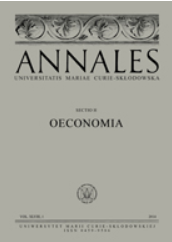Usage of Behavioural Innovation in the Context of the COVID-19 Crisis
Usage of Behavioural Innovation in the Context of the COVID-19 Crisis
Author(s): Monika Czerwonka, Joanna SiembidaSubject(s): Economy, Socio-Economic Research
Published by: Wydawnictwo Naukowe Uniwersytetu Marii Curie-Sklodowskiej
Keywords: COVID-19; behavioural economics; crisis; pandemic
Summary/Abstract: Theoretical background: The theoretical basis for this paper are issues of behavioural economics that question a standard assumption of homo oeconomicus and provide knowledge on the way people make decisions. It refers mainly to extraordinary situations such as, e.g. the COVID-19 pandemic. The article draws also on Thaler’s nudge theory, which claims that some aspects of behavioural theory might be successfully used to shape public policies using appropriate tools (simplicities, default options, framing, approximation of consequences, design, or reference to social norms).Purpose of the article: The article aims to overview the use of tools of behavioural economics to fight the COVID-19 pandemic and to popularize these solutions. There were presented examples of how behavioural innovations are used in various contexts by state authorities from different parts of the world. The overview may provide inspiration for implementing new solutions based on nudge theory that ultimately would contribute both to more effective and higher-rated actions undertaken by governments as well as to faster combat against the pandemic.Research methods: The article refers to theories from behavioural economics (prospect theory, nudge theory) and media reports on methods of fighting and mitigating negative effects of the COVID-19 pandemic in various countries, also those with different cultural backgrounds. The article provides an overview of such methods and presents mechanisms of behavioural economics that underlie them, along with positive results of these very methods, thereby proving their effectiveness.Main findings: The mechanisms presented, and the examples of their consecutive appliance prove the effectiveness of behavioural economics as a tool in the combat against the COVID-19 pandemic. Despite potential cultural differences, the effectiveness of behavioural tools across countries with different cultural backgrounds was presented. It was suggested that applying choice architecture on a larger scale in public policies may bring about positive effects, especially in crisis situations such as, e.g. a pandemic on a global scale.
Journal: Annales Universitatis Mariae Curie-Skłodowska, Sectio H Oeconomia
- Issue Year: LVI/2022
- Issue No: 3
- Page Range: 7-17
- Page Count: 11
- Language: English

